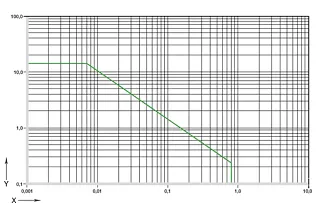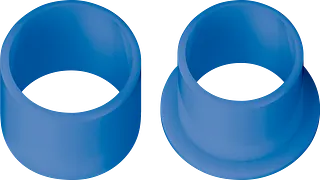Change Language :
iglidur® A160 - material data
The most important specifications at a glance
iglidur A160 plain bearings are characterised by extreme media resistance at a low cost. Tribologically optimised, the material can be used in temperatures up to +90°C and also conforms to demands of the food processing sector. The profile of properties is completed by the "optical detectability", i.e. the blue colour, often required in the industry.
| Descriptive technical specifications | ||
|---|---|---|
| Wear resistance at +23°C | - 🟧 🟧 🟧 ⬜️ ⬜️ + | More information on wear resistance |
| Wear resistance at +90°C | - 🟧 ⬜️ ⬜️ ⬜️ ⬜️ + | |
| Wear resistance at +150°C | - 🟧 ⬜️ ⬜️ ⬜️ ⬜️ + | |
| Sliding properties | - 🟧 🟧 🟧 🟧 ⬜️ + | Coefficient of friction, dynamic, against steel: µ 0.09 – 0.19 |
| Wear resistance under water | - 🟧 🟧 🟧 ⬜️ ⬜️ + | |
| Media resistance | - 🟧 🟧 🟧 🟧 ⬜️ + | More information on media resistance |
| Resistant to edge pressures | - 🟧 🟧 🟧 ⬜️ ⬜️ + | |
| Resistant to shock and impact loads | - 🟧 🟧 🟧 🟧 ⬜️ + | |
| Dirt resistance | - 🟧 🟧 🟧 🟧 ⬜️ + |
Temperatures
The compressive strength of iglidur A160 plain bearings decreases with increasing temperatures. The temperatures prevailing in the bearing system also have an influence on bearing wear. Additional protection is required at temperatures higher than +60°C.
Further information on temperature
| min. application temperature | Upper application temperature, long-term | Upper application temperature, short-term | In addition secure axially from |
|---|---|---|---|
| -50°C | +90°C | +100°C | +60°C |
Permissible surface speeds
iglidur A160 was developed for low surface speeds. Maximum speeds of up to 0.5m/s (rotating) and 2.0m/s (linear), respectively, are permissible during continuous dry operation. The values given in the table indicate the limits at which frictional heat causes an increase up to the continuously permissible temperature. In practice, these limit values cannot always be achieved due to interactions.
Surface speeds of various iglidur materials
| Maximum surface speeds [m/s] | Rotating | Oscillating | linear |
|---|---|---|---|
| Long-term | 0.5 | 0.4 | 2.0 |
| Short-term | 0.7 | 0.6 | 3.0 |
Permissible pv values

Diagram 01: Permitted pv values for iglidur A160 plain bearings with 1mm wall thickness in dry operation against a steel shaft, at +20°C, installed in a steel housing
X = surface speed [m/s]
Y = pressure [MPa]
Mechanical properties
The compressive strength of iglidur A160 plain bearings decreases with increasing temperatures. Diagram 02 illustrates this relationship. The maximum recommended surface pressure represents a mechanical material parameter. Conclusions about the tribology cannot be drawn from this. Diagram 03 shows the elastic deformation of iglidur A160 under radial loads. Under the maximum recommended surface pressure of 15MPa, the deformation is less than 3%. Plastic deformation can be neglected up to this radial load. However, it is also dependent on the duty cycle of the load.
Friction and wear
Coefficient of friction and wear resistance change with the application parameters. With iglidur A160 plain bearings, altering the coefficient of friction µ as a function of surface speed has less effect. With increasing load, however, the coefficient of friction decreases significantly. The optimum shaft roughness with regard to the coefficient of friction is 0.6 - 0.7Ra.
Coefficients of friction against steel (Ra = 1μm, 50HRC):
| iglidur A160 | dry | Greases | Oil | Water |
|---|---|---|---|---|
| Coefficient of friction μ | 0.09 - 0.19 | 0.08 | 0.03 | 0.04 |
Shaft materials
Diagram 06 shows an extract of the results of tests with different shaft materials carried out with iglidur A160 plain bearings in dry operation. For rotational applications with low loads, the most interesting, media and corrosion-resistant shaft materials 304 stainless steel, high grade steel and hard-chromed steel prove to be particularly good mating partners. On high grade steel shafts, however, the wear increases most rapidly with the load (diagram 06). On Cf53 shafts, the wear in pivoting applications is exemplary compared to rotating applications. As with many other iglidur materials, wear is higher in rotating than in pivoting applications (diagram 07).
Chemical resistance
iglidur A160 plain bearings can be used under a wide range of environmental conditions and in contact with numerous chemicals. The table provides an overview of the chemical resistance of iglidur A160 plain bearings at room temperature.
All data at room temperature [+20 °C], + resistant 0 conditionally resistant - non-resistant
| Medium | Resistance |
|---|---|
| Alcohols | + |
| Greases, oils without additives | + |
| Hydrocarbons | + |
| Fuels | + up to 0 |
| Strong alkalines | + |
| Strong acids | + |
| Diluted alkalines | + |
| Diluted acids | + |
Installation tolerances
iglidur A160 plain bearings are standard bearings for shafts with h-tolerance (recommended minimum h9). The bearings are designed for press-fit into a housing machined to a H7 tolerance. After being assembled into a nominal size housing, the inner diameter automatically adjusts to the E10 tolerances.
Important tolerances according to ISO 3547-1 after press-fit:
| Diameter d1 [mm] | Housing H7 [mm] | iglidur A160 plain bearing E10 [mm] | Shaft h9 [mm] |
|---|---|---|---|
| up to 3 | +0.000 +0.010 | +0.014 +0.054 | -0.025 +0.000 |
| > 3 up to 6 | +0.000 +0.012 | +0.020 +0.068 | -0.030 +0.000 |
| > 6 up to 10 | +0.000 +0.015 | +0.025 +0.083 | -0.036 +0.000 |
| > 10 up to 18 | +0.000 +0.018 | +0.032 +0.102 | -0.043 +0.000 |
| > 18 up to 30 | +0.000 +0.021 | +0.040 +0.124 | -0.052 +0.000 |
| > 30 up to 50 | +0.000 +0.025 | +0.050 +0.150 | -0.062 +0.000 |
| >50 to 80 | +0.000 +0.030 | +0.060 +0.180 | -0.074 +0.000 |
| >80 to 120 | +0.000 +0.035 | +0.072 +0.212 | -0.087 +0.000 |
| > 120 up to 180 | +0.000 +0.040 | +0.085 +0.245 | -0.100 +0.000 |

Buy iglidur A160 products in the online shop
- Large selection of moulds and materials
- Available within 24 hours
- No minimum order value
- No minimum order quantity
Typical application areas
Consulting
I look forward to answering your questions

Shipping and consultation
In person:
Monday to Friday from 09:00 - 17:00
Online:
24h









